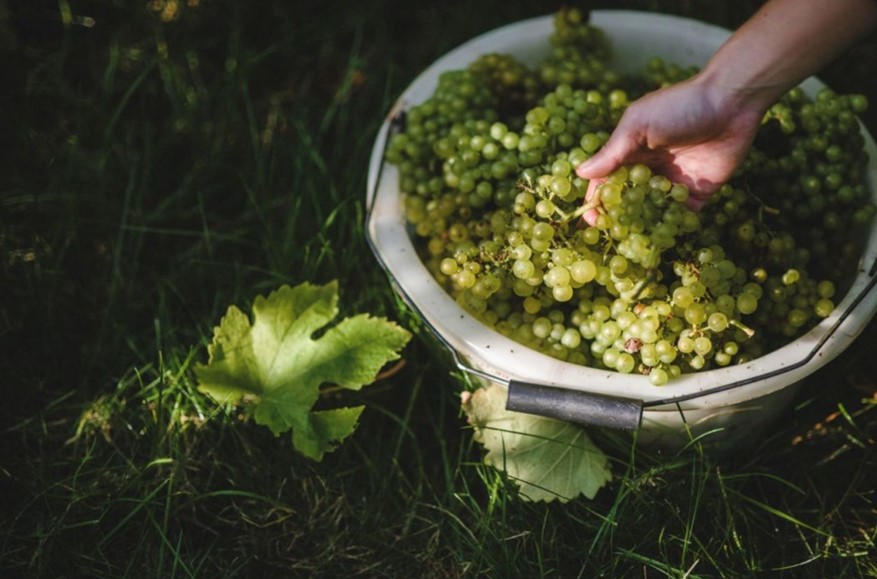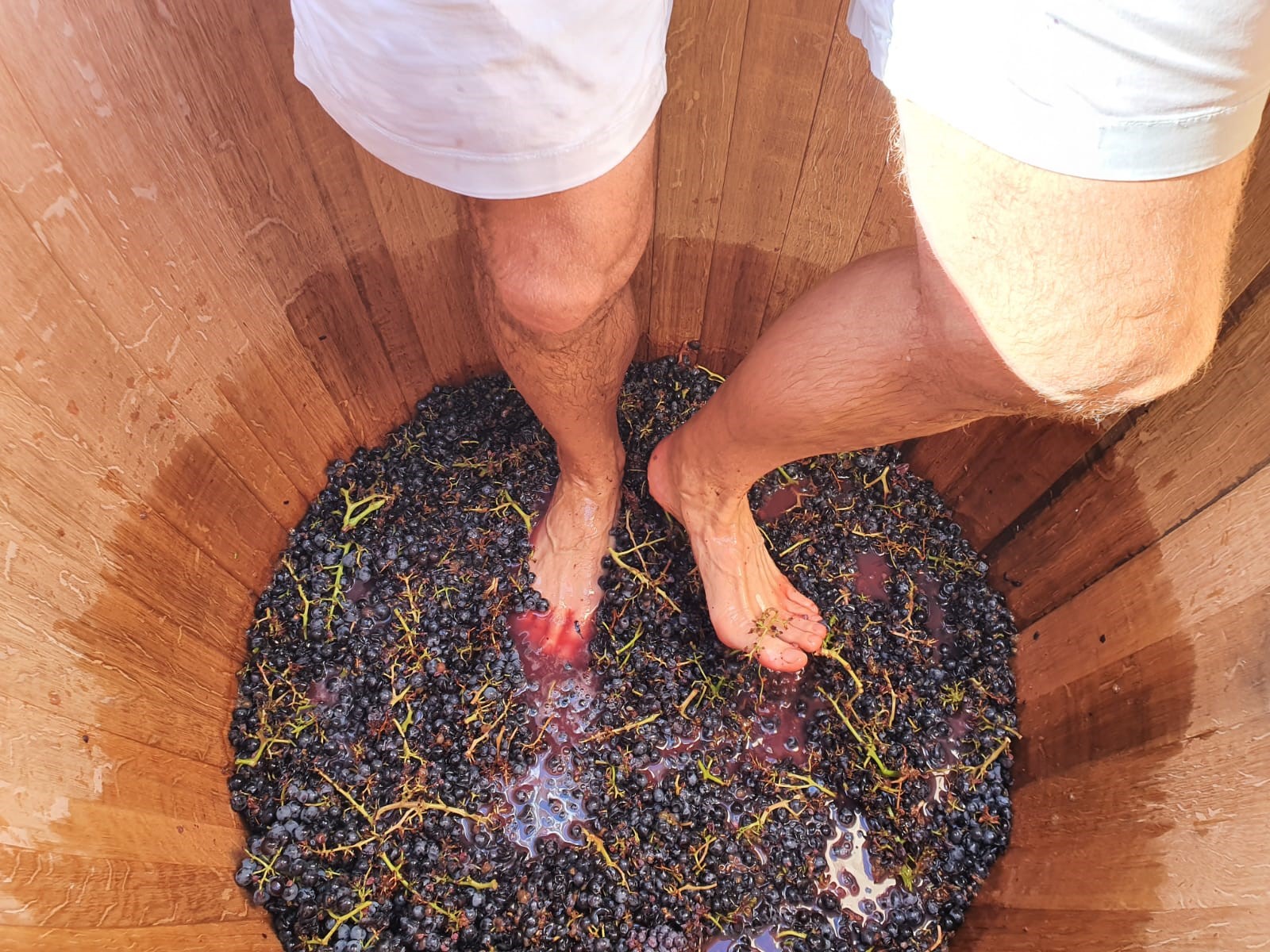At the beginning of July we are running our first ever wine course. This immersive weekend experience is all about getting physical with the wine making process, using your senses and getting some insight into how wine is made, in order to gain a deeper understanding of how you taste it and what you like. No experience required, just bring your head, heart, hands and taste buds!
Well known wine communicator and ex-head of wine at Waitrose, Justin Howard-Sneyd, is heading up the course alongside Duncan Schwab, CEO and Head Winemaker at our neighbours Sandridge Barton, home of Sharpham Wine. We have a chat to Justin about his background and what he hopes people will gain from the course.

When and why did you first get into wine?
Well, I definitely used to eat quite a lot of wine gums at school! I was quite fond of blind tasting them to see if I could tell which colour it was, so I guess it all started there. I remember a trip to France with my family when I was 11 which involved a visit to a Bordeaux chateau, the smell of the cellar, and the taste of the wine out of an oak barrel had quite an impact.
Much later on I ended up working for a big wine competition and learnt a lot about wine tasting from the wines before we threw them away. I then worked in a wine shop before travelling around working at vineyards in South Africa and various places in the northern hemisphere, I followed the harvest for about three years.
When I came back I was very lucky to get a job as a wine buyer for Safeway – I was given an obscure Hungarian wine to taste in the interview and I guessed it straight away because I had worked in Hungary. As part of the job I got involved with the winemaking process with smaller makers to assist with getting it right. While I was at Safeway I did my Master of Wine exam qualification, and then I moved on to Sainsbury’s as a senior wine buyer, and then went on to Waitrose as head of wine– which was a great job. I got to work with a lot of really interesting wines. It’s really important to understand what your customers want to drink and what they respond to – that’s what working as a buyer for supermarkets really gave me.
Is there a gap between what everyday drinkers think is good and what people in the wine industry regard as good?
Massive gap, yes! Those in the industry tend to get bored and move on a lot quicker, whereas most people find a wine they like and stick with it for a long time. The wine experts tend to constantly look for the new, and that’s not what most people tend to want when having a glass of wine with a meal at home on a Friday night.
How did owning your own vineyard happen?
Having had the three year stint making wine for other people I definitely formed the notion that someday I wanted to make a wine for myself. I didn’t know where or how or have a strong idea about what I wanted to make, I just felt that I wanted to explore it. So when we felt like it was time, my wife and I took a few trips to France – and when we first went to the Roussillon region near the Spanish border, we totally fell in love with it. And what’s more, the vineyards were very cheap!
It was easy to dip our toes into the water without having to raise a lot of finance – we didn’t buy a winery, we just bought a couple of small fields filled with vines and borrow a corner of someone else’s winery to make it.
What is a popular misconception about wine?
Yes, there’s a few things that really bug me. People have it fixed in their head that a good wine gets better as it gets older, it’s a kind of trope, it’s actually only true for very few wines, most wines are designed to be drunk quite quickly. You shouldn’t keep them for two years in your kitchen – most bottles are meant to be drunk between 6 months and a year.
The other thing is people are obsessed with wine and cheese and think that red wine goes better with cheese but actually white wine goes better with cheese as there’s no tannins in white – especially soft cheese which really doesn’t like tannin.
What is the best way to learn about wine?
I really advocate learning by doing – the physicality of immersing yourself in the process of wine making, the smell and the touch, is much more powerful than just reading about it or being told about it. And that’s the aim of the Crush Course – we will take people through the wine making process, including crushing grapes with their bare feet. It’s the way I like to learn, and I’ve always been excited by getting people to learn by doing rather than by sitting in a classroom. Plus you get to taste wine when doing it like that, which is always a bonus! I really want to set people up so they can then go off and explore and learn about wines on their own once they have left.
What is your top tip for people wanting to learn about wine?
That’s really simple – open more than one wine at the same time.
That doesn’t mean you have to drink them straight away – wine will last much longer than you think if you stick the cork back in and put it in the fridge.
One great thing to do is get friends over, decide on a grape variety, get different bottles in the variety, taste the two side by side and talk about the differences and similarities. The human brain is not very good at remembering tastes and smells, so you have to work at it to start building up your taste memory, and comparing similar wines is a great way to do it.
What do you want people who come on the Crush Course weekend to take away with them?
If you join us on the course, I would love you to come away with a series of physical memories, it’s really going to be all about the seeing, touching smelling, the handling of the grapes as well as the drinking of the wine. I think that these elements will lock in your brain what we’ll be learning, much more than just learning in a classroom setting.
We want to create an understanding of how wine is made in order to improve your drinking experience. When you go home and taste new wines, you will know that part of what you are tasting comes from the grape and also a large part of it comes from the skill of the winemaker. We also want you to understand your own palate better and to learn about what you enjoy – it’s very much about finding your own taste and using that knowledge to guide the wines you buy.
The Crush Course is a residential course which runs from 2nd to 4th July. Click here for more information and to book.

